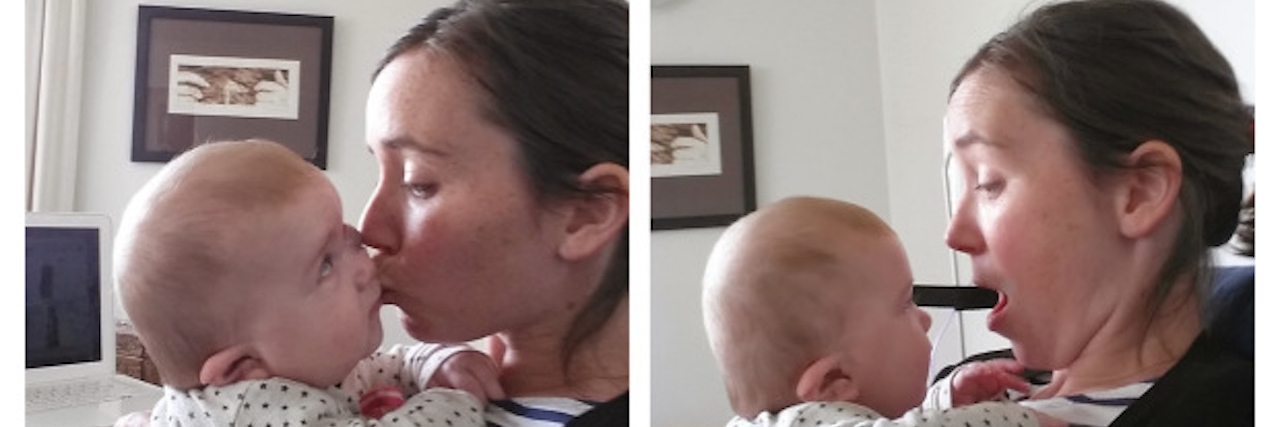I was at sign language class last week, and the instructor started going around to each person, asking them if they had children. This was all without words of course. I was sitting beside my new friends with their gorgeous baby girl at the end of the circle. As he asked each person, I felt panic rising in my chest. Do I say I have a daughter? How do I indicate she has died? I didn’t know the sign for that, and all the things I could think of to indicate it were grotesque and inappropriate. I thought about the silence that would descend on the already silent class after I signed that yes I had a daughter but she was gone.
When he got to me, I shook my hand and head. No. No children. I’d promised myself I wouldn’t deny Eva, ever. But in a language where I couldn’t explain, couldn’t reassure, couldn’t sum up, I was stumped.
I thought about it all night. A week later, I’m still thinking about it.
This baby should not be denied.
The next night I met a man who worked at a pediatric cancer fundraiser. I told him about Eva, and he was asking various questions about her. Then he paused and said, “I’m going to ask you something you’ve probably been asked before.” I tensed up, ready to respond.
“When she died, did you feel relieved?”
I didn’t pause to think.
“No. No, I didn’t feel relieved.”
He nodded and smiled, and I saw pity in his face. Like I should have felt relief. Like I was under some spell that stopped me from realizing the truth. Like he knew better and I was the lovestruck mother who couldn’t see the forest for the trees.
I wanted to make him see.
“I know where that question comes from,” I started. “I think before Eva I would have thought someone in my position might have felt relieved.”
I paused. How do I convince him or anyone that her life was worthwhile in and of itself?
“She was a very happy baby,” I started and faltered.
Telling people she was happy isn’t enough. People have this idea of children with disabilities — that their happiness doesn’t shatter. It’s a myth. Children are children. Children with issues around mobility or senses or development will find some things frustrating, just like any other child. That frustration can be difficult to handle. I can imagine when Eva got older, she would have made that frustration clear to me, either physically or verbally. I’m confident it would have been difficult. Very difficult. For me and for her. This difficulty would have challenged me, but its absence doesn’t make me feel relief. When our toddlers hit us and bite us and scream at us (which they all do, condition or no condition) we might throw our hands up. We might find it difficult. We never once wish them gone permanently because of it. An afternoon off, sure! But their death would not be a relief.
Maybe I was spared of those moments, those times when Eva wasn’t a “happy baby.” Maybe I’ve been spared of a future where Eva, like many other kids with CHARGE syndrome, decided to stop sleeping at some stage of toddlerhood. I will never know what her future looked like. And that doesn’t feel like a relief. It feels like a life sentence. I can imagine what she might have done, but I will never know.
It doesn’t feel like relief to me.
I wasn’t prepared for that man’s question. I will be next time.
Trying to define her worth by saying she was a happy baby is not enough to me now. Her life had quality and an essence all its own. She was a person. She didn’t have to be happy for anyone else but herself. She didn’t have to prove anything to anyone. She showed people a lot, but that wasn’t her duty. She existed and experienced and laughed and loved. She owed no one anything. Just as I owe no one anything. And you owe no one anything.
This man’s question comes from a specific place. He works with families with sick kids. Families who may see their children suffer. His question comes from a place of seeing Eva as a baby who was suffering.
CHARGE syndrome is not an illness. It was something in Eva’s genes, just like her blue eyes and her lovely blond hair. It was in her, but it did not define her. She didn’t suffer from it, although parts of it did cause her pain and sickness.
Eva was a person who I was excited to see grow and develop in whatever way she saw fit. She would have had challenges, and I was ready and willing to help her face them. I was looking forward to trying to make the world fit her, rather than the other way round.
Eva was not my burden. So no, I don’t feel relieved.
A longer version of this post originally appeared on The One in a Million Baby.
Want to celebrate the human spirit? Like us on Facebook.
And sign up for what we hope will be your favorite thing to read at night.

